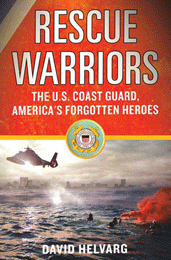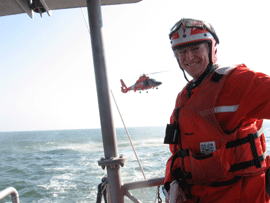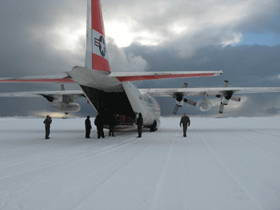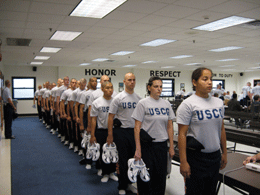Duck-Scrubbing Heroes
Air Date: Week of July 3, 2009

The Coast Guard tackles everything from dangerous rescue missions to nasty oil spill clean-ups, earning guardsmen the playful nickname "duck scrubbers." But ocean conservationist David Helvarg says the Coast Guard's environmental duties are vastly important to marine life and underappreciated in the U.S. military. Helvarg talks with host Jeff Young about his new book, "Rescue Warriors: The U.S. Coast Guard: America's Forgotten Heroes."
Transcript
YOUNG: We all know the U.S. Coast Guard for their daring rescues at sea and the watchful eye they keep on our shores. But a new book chronicles the important and often- overlooked role the Guard plays in protecting our environment.
Ocean conservationist David Helvarg spent years following the Coasties from the hurricane wreckage of Louisiana to an oil spill in San Francisco Bay. His book is called "Rescue Warriors: The U.S. Coast Guard, America's Forgotten Heroes." And Helvarg argues that the Coast Guard is actually the country's oldest environmental agency.

Author David Helvarg on assignment with the Coast Guard.
YOUNG: And one of their early heroes that you write about was this guy Mike Healy who has this great nickname I love “Hell Roarin’ Mike Healy.”
HELVARG: He was a very rough and tumble character and he and the Bear, which was his cutter, they saved whalers who were stranded in the ice. At one point when the whaling and the sealing was impacting native Alaskans food sources, he sailed the Bear over to Siberia and bought a herd of reindeer. They dragged them up onto the cutter and brought them back to Alaska and that was the beginning of reindeer herding. Mike Healy was actually African-American, but at the time he had to pass for white in order to have command of the Coast Guard. He was also hated by both the seal poachers and the temperance societies because he was well known hard drinker in all the bars up and down the west coast.
YOUNG: As I understand it from your book that their work in the early Alaskan frontier really influenced a lot of the later environmental items that they would take on as their duty.

A C-130 deploys in the Aleutians to watch over the Alaska fishing fleet.(Photo: David Helvarg)
YOUNG: You wrote about a big bust of fishery pirates that happened, when is this, the late 80’s, early 90’s. They were chasing down these Taiwanese salmon fisheries.
HELVARG: Yeah, late 80’s, early 90’s in the North Pacific there was a whole legal drift net fisheries over a thousand boats from Asia that were laying out these walls of death, these monofilament nets that could stretch thirty miles in length, killing thousands of dolphins and small whales and sea birds. And within these fleet there was a small pirate operation, about ten percent of them were taking salmon at sea. And there was a treaty between Japan, the U.S., Canada and Russia that these salmon should only be caught when they returned to their home rivers. They set up a sting and they went out to sea.

Enlisted training in Cape May, New Jersey. (Photo: David Helvarg)
YOUNG: You know this is amazing work they do. They’re police on the high seas. They do these amazing rescues. They’re protecting our natural resources. And yet, the Coast Guard – it’s like they’re the Rodney Dangerfield of the military. They just don’t get respect.
HELVARG: It’s funny. I’ve talked to a lot of young coasties who say, “you know, I want to serve my country, but I want to be in a service that saves lives rather than takes them.” And they do, they respond to 125 distress signals every day. They save fifteen people on average every day.
YOUNG: Wow.
HELVARG: And they also do the resource protection, oil spill response. But the oil spill response people are often to referred to in the service as duck scrubbers and the fisheries guys as fish huggers. Which seems unfair ‘cause they don’t call the maritime safety and security teams, they don’t call them gun huggers.

HELVARG: Yeah. They went in and they saved over 33,000 people in the first week after Katrina when much of the rest of the federal government was absent without leave. It was the coasties and the Louisiana Fish and Game who were out there pulling people off of rooftops and getting people out of flooded areas and to safety. When I was down there it reminded me of a lot of war zones I’ve been in with maybe fewer casualties, about 1,600 deaths, but far wider destruction. And the Coast Guard does what it does every hurricane season. They move their people out of the way of the approaching storm, just positioning them strategically around it, then surge back in afterwards.
YOUNG: But you also write about another Coast Guard mission that in your opinion did not go so well. And that was when a container ship spilled its bunker fuel in the San Francisco Bay. And that’s basically your backyard.
HELVARG: Yeah, I literally had oiled and dead ducks and wildlife washing up behind my townhouse in the East Bay. And the Coast Guard response was not good, you know. That morning that the Cosco Busan hit the bridge and spilled 53,000 gallons of bunker fuel which is like the dregs of the petroleum process. There’s nothing you can refine after bunker fuel other than roofing tar. And Admiral Bone who came from a safety and environmental background was telling me that morning that because of the heavy emphasis on security since 9/11 that the Coast Guard’s been losing some core competencies in safety and stewardship, environmental protection.

The Coast Guard inspects an oil tanker off the coast of Iraq. (Photo: David Helvarg)
HELVARG: Yeah, and I suspect that had it been a terrorist who had blown up that ship their MSST teams, their anti terrorist maritime security and safety teams would have been on it within minutes. There’s been a huge expansion of funding since 9/11 but almost all of it on the security side. And we haven’t seen similar growth in terms of ship safety, although the global shipping fleet is expanding or maritime stewardship, although we’re seeing the collapse of marine wildlife and food security with the loss of fisheries. You know, we’re no longer in a world in which we can respond to all crisis with guns. We have to be able to respond to an unknowable range of threats in a world that’s two-thirds salt water. And to me that response is best done by the well-trained gals and guys of the Coast Guard
YOUNG: David Helvarg founded the coastal conservation group Blue Frontier Campaign, and his new book is called “Rescue Warriors: The U.S. Coast Guard: Americas Forgotten Heroes. David, thanks very much.
HELVARG: Thank you.
[MUSIC: James Horner “Coast Guard Rescue” from the Perfect Storm Soundtrack (Sony Classical 2000)]
Links
Click here to find out more about David Helvarg’s book, “Rescue Warriors.”
Living on Earth wants to hear from you!
Living on Earth
62 Calef Highway, Suite 212
Lee, NH 03861
Telephone: 617-287-4121
E-mail: comments@loe.org
Newsletter [Click here]
Donate to Living on Earth!
Living on Earth is an independent media program and relies entirely on contributions from listeners and institutions supporting public service. Please donate now to preserve an independent environmental voice.
NewsletterLiving on Earth offers a weekly delivery of the show's rundown to your mailbox. Sign up for our newsletter today!
 Sailors For The Sea: Be the change you want to sea.
Sailors For The Sea: Be the change you want to sea.
 The Grantham Foundation for the Protection of the Environment: Committed to protecting and improving the health of the global environment.
The Grantham Foundation for the Protection of the Environment: Committed to protecting and improving the health of the global environment.
 Contribute to Living on Earth and receive, as our gift to you, an archival print of one of Mark Seth Lender's extraordinary wildlife photographs. Follow the link to see Mark's current collection of photographs.
Contribute to Living on Earth and receive, as our gift to you, an archival print of one of Mark Seth Lender's extraordinary wildlife photographs. Follow the link to see Mark's current collection of photographs.
 Buy a signed copy of Mark Seth Lender's book Smeagull the Seagull & support Living on Earth
Buy a signed copy of Mark Seth Lender's book Smeagull the Seagull & support Living on Earth

